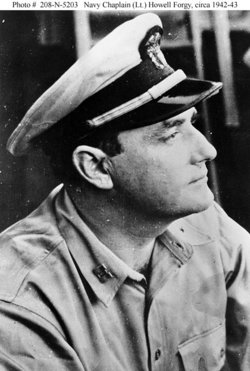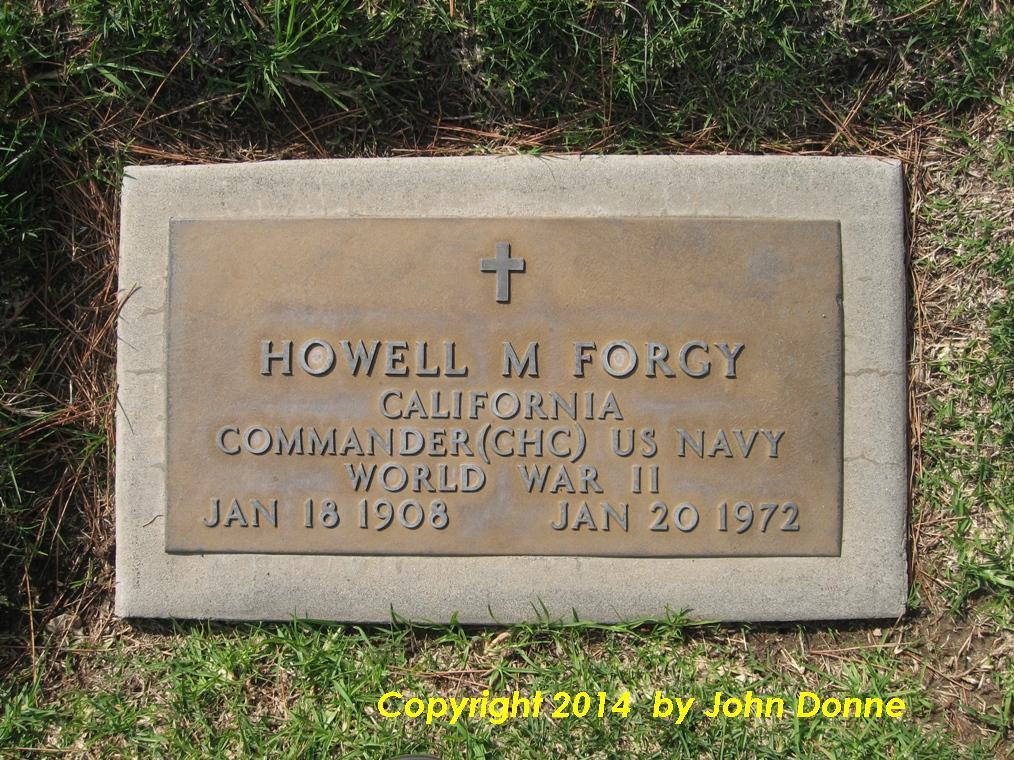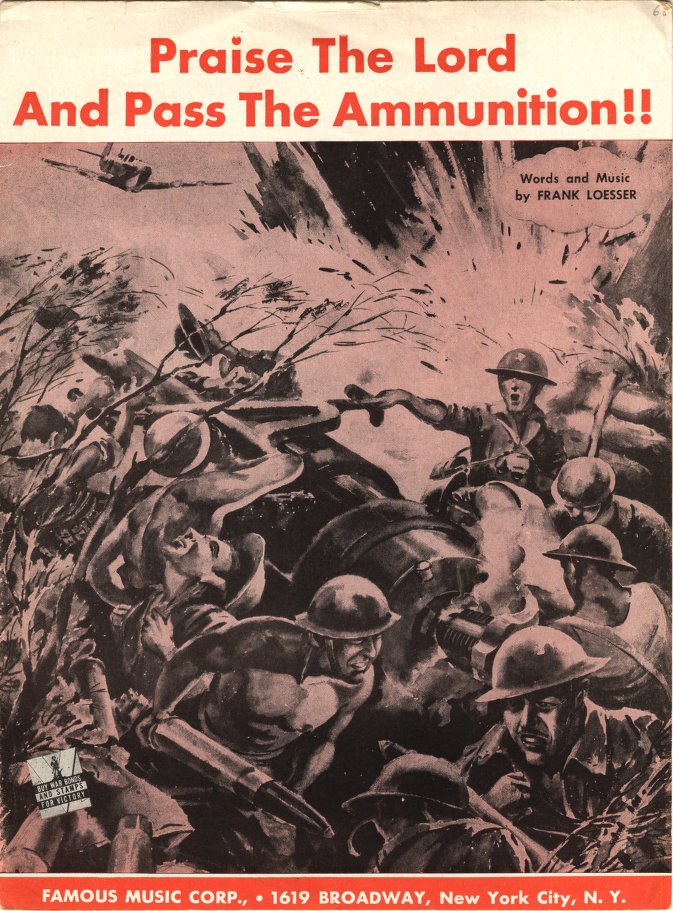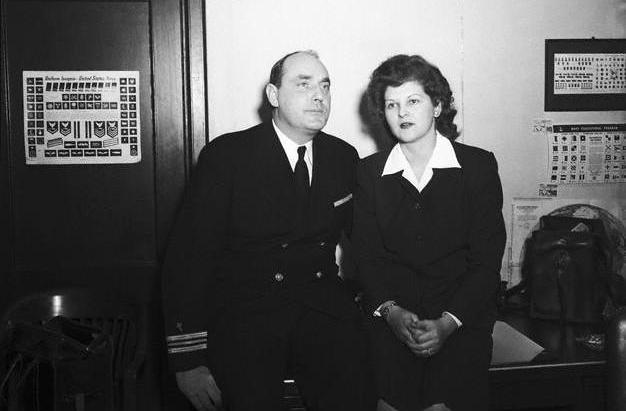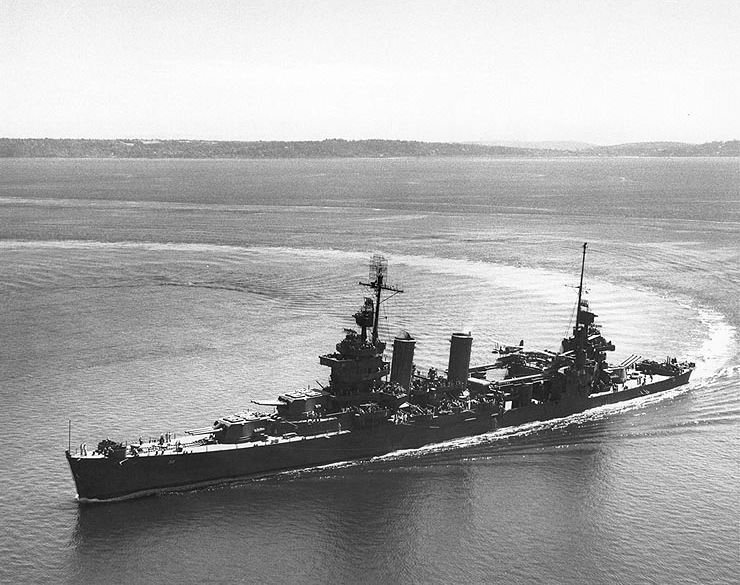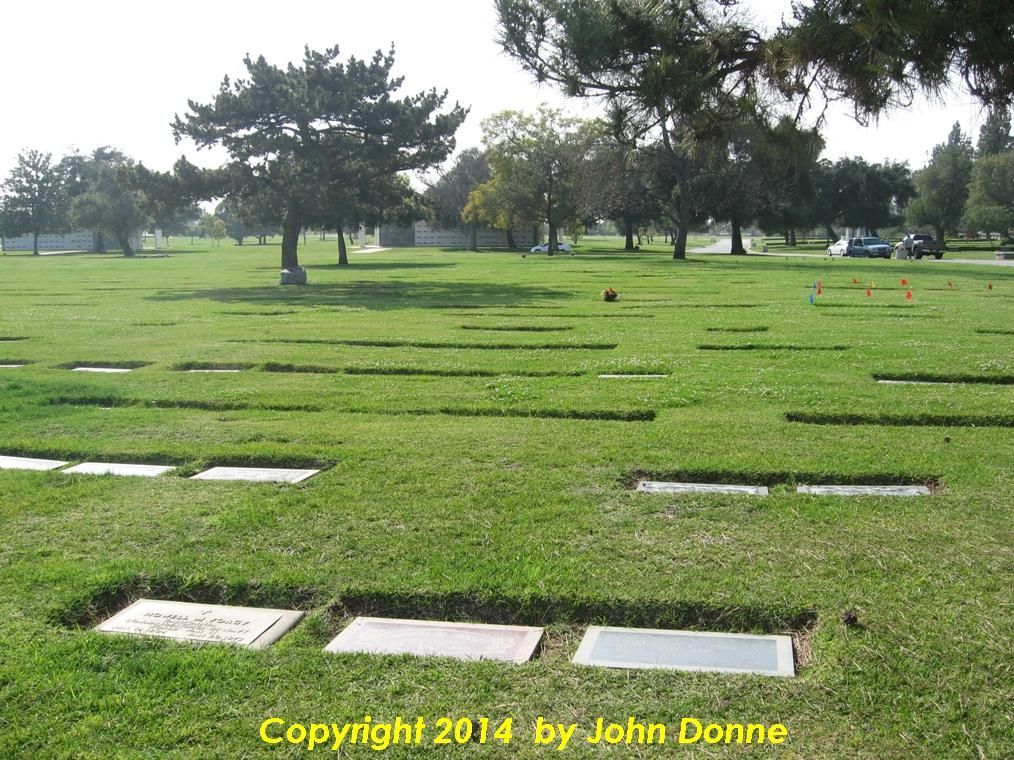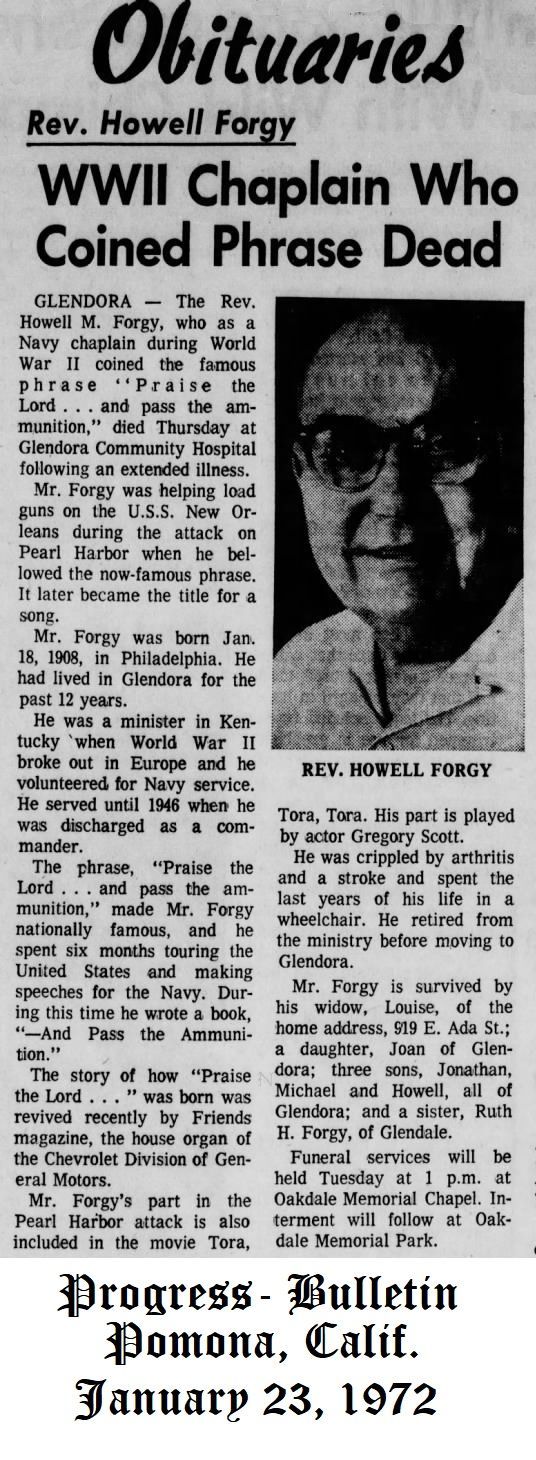"Praise the Lord and Pass the Ammunition!!"
while witnessing the Japanese surprise attack from the deck of the heavy cruiser, USS New Orleans at Pearl Harbor, Territory of Hawaii on December 7, 1941.
Born and raised in Philadelphia's Ward 34, and for a few years living in Redlands and Pasadena, California during the late 1910's, "How" was the son of Maurice Forgy, a Cadillac mechanic, and his wife, Clara. At 6'2", 200 pounds he was a top lineman on the championship team at West Philadelphia H.S. and later Muskingum (Ohio) College. His friends knew of his intention to enter the ministry and affectionately called him "Father Forgy".
How graduated from the Princeton Theological Seminary in 1937 and first served at the Presbyterian church in Ft. Collins, Colorado. He was next sent to Murray, Kentucky, where he found "nine Presbyterians, very little money and a great desire to build a church." When he joined the Navy in 1940 after graduating from Murray State Teacher's College in Kentucky, Rev. Forgy left behind a new church, a thriving congregation of 150 souls and his beloved wife, Louise Morgan, whom he had met when she sang in his church choir.
Forgy was a lieutenant (j.g.) with the Chaplain Corps stationed aboard the cruiser USS New Orleans (CA-32) at Pearl Harbor when the Japanese struck on Sunday morning, December 7, 1941 at 0748 hours. USS New Orleans was undergoing turbine repairs at the 1010 dock and was without dockside power at the time of the surprise attack.
In an interview in the 1960's, Forgy recalled, "It was a typical peacetime Navy Sunday. Most of the officers and men were ashore. I was lying in my bunk thinking about my morning sermon when the ship shuddered. The general quarters alarm sounded and the loudspeaker cried, 'All hands to battle stations! All hands to battle stations! This is no drill! This is no drill! I ran to my station in sick bay and asked the doctor, 'Is this for real?' It was indeed for real. Japanese planes were attacking. I asked and received permission to go above, and a plane buzzed the ship as I stepped outside the hatch. Bullets ricocheted and I did a jig down the deck...."
At that moment Chaplain Forgy saw "what was to remain the most shocking sight in my whole life" - as the battleship USS Arizona (BB-39) blew up a short distance away. Over the loudspeaker, Forgy heard the urgent command for "the man with the keys to the ammunition locker to lay (go) below!" Lieutenant Edwin Woodhead, from Boise, Idaho, was standing nearby, and recalled later, "Suddenly we saw a Japanese plane fall in flames." In words more befitting his football days, Woodhead heard Forgy exclaim, "We got one of those sons of _ _ _ _ _ _ _! " "Break out the ammunition!" Woodhead shouted. But, as luck would have it, the man with the keys had gone to shore with the keys in his pocket.
Chaplain Forgy helped crewmen break into the ammo lockers with fire axes. Because the ammunition hoists were inoperable, a "bucket-brigade" line was formed to pass the ammunition topside to the 5" deck guns. The former football lineman turned preacher wanted to boost one of the shells to his shoulder. "But a chaplain cannot fire a gun or take material part in a battle." There was little time for reflection, but Forgy did the next best thing.
"The boys were getting dog-tired," Forgy recalled later. "All I did was slap them on the backs and smilingly said, 'Praise the Lord and pass the ammunition'. I guess I used unchaplainlike language because afterward on the well deck of our cruiser I overheard a couple of boys say, 'Chaplains can cuss like a bo'sun mate when they have to'." The slogan may be the shortest sermon on record and became the title of a song written by Frank Loesser that was one of the most popular songs of World War II. Loesser donated all his royalties from the sale of the song to the Navy Relief Society.
"Not until months later," Forgy recalled, "did I find out a popular ballad had been made out of that remark." The song was recorded by big bands and crooners of the day, notably Kay Kyser and his Orchestra. For some time after Pearl Harbor, stories circulated between servicemen and in their letters home about the "sky pilot" that uttered the famous phrase.
The stories made their way to the press where some writers attributed it to various other chaplains. Another lieutenant on the USS New Orleans said that when crewmen on the ship heard the song, they would kid Chaplain Forgy and encourage him to step up and set the record straight about who really uttered the famous battle cry. Forgy was reluctant to do so, saying, "the episode should remain a legend rather than be associated with a particular person." Eventually reporters were able to interview the men aboard USS New Orleans that were involved in the "ammunition story". After that, Navy brass permitted the press to interview Chaplain Forgy and the rest is history. He was asked to give numerous interviews, including one printed in Time magazine, titled, "On Religion: Change of Tune", that ran on Sept. 27, 1943. The following year saw the publication of his best selling memoirs, AND PASS THE AMMUNITION detailing his wartime experiences in the South Pacific and sustaining faith aboard USS New Orleansi, one of the most decorated ships of the Second World War. Rev. Forgy retired from the Navy in May 1946 with the rank of Commander.
Forgy appeared on the game show I've Got a Secret in an episode that originally aired May 18, 1955, and recalled the story as follows:
Well, I was stationed aboard the USS New Orleans, and we were tied up at 1010 dock in Pearl Harbor when we attacked again. We were having a turbine lifted, and all of our electrical power wasn't on, and so when we went to lift the ammunition by the hoist, we had to form lines of men — form a bucket brigade — and we began to carry the ammunition up through the quarterdeck into the gurneys, and I stood there and directed some of the boys down the port side and some down the starboard side, and as they were getting a little tired, I just happened to say, "Praise the Lord and pass the ammunition." That's all there was to it.
Forgy was pastor of the Presbyterian church at Hollister, California in 1959 when he became afflicted with arthritis and suffered a stroke that confined him to a wheelchair. Retiring to Glendora, California with his wife and children, he was national chairman of the Pearl Harbor Survivor's Ass'n. in the early 1960's and was occasionally interviewed- usually around the anniversary of the attack on Pearl Harbor.
Pastor Howell Forgy died two days after his 64th birthday, survived by his wife, Louise, daughter Joan, and sons Michael, Howell and David.
Biography by John Donne
Grateful thanks to Member and Patriot Frogman for his generous sponsorship of Rev. Howell Forgy's memorial. God's Blessing on You and Yours from a friend!
"Praise the Lord and Pass the Ammunition!!"
while witnessing the Japanese surprise attack from the deck of the heavy cruiser, USS New Orleans at Pearl Harbor, Territory of Hawaii on December 7, 1941.
Born and raised in Philadelphia's Ward 34, and for a few years living in Redlands and Pasadena, California during the late 1910's, "How" was the son of Maurice Forgy, a Cadillac mechanic, and his wife, Clara. At 6'2", 200 pounds he was a top lineman on the championship team at West Philadelphia H.S. and later Muskingum (Ohio) College. His friends knew of his intention to enter the ministry and affectionately called him "Father Forgy".
How graduated from the Princeton Theological Seminary in 1937 and first served at the Presbyterian church in Ft. Collins, Colorado. He was next sent to Murray, Kentucky, where he found "nine Presbyterians, very little money and a great desire to build a church." When he joined the Navy in 1940 after graduating from Murray State Teacher's College in Kentucky, Rev. Forgy left behind a new church, a thriving congregation of 150 souls and his beloved wife, Louise Morgan, whom he had met when she sang in his church choir.
Forgy was a lieutenant (j.g.) with the Chaplain Corps stationed aboard the cruiser USS New Orleans (CA-32) at Pearl Harbor when the Japanese struck on Sunday morning, December 7, 1941 at 0748 hours. USS New Orleans was undergoing turbine repairs at the 1010 dock and was without dockside power at the time of the surprise attack.
In an interview in the 1960's, Forgy recalled, "It was a typical peacetime Navy Sunday. Most of the officers and men were ashore. I was lying in my bunk thinking about my morning sermon when the ship shuddered. The general quarters alarm sounded and the loudspeaker cried, 'All hands to battle stations! All hands to battle stations! This is no drill! This is no drill! I ran to my station in sick bay and asked the doctor, 'Is this for real?' It was indeed for real. Japanese planes were attacking. I asked and received permission to go above, and a plane buzzed the ship as I stepped outside the hatch. Bullets ricocheted and I did a jig down the deck...."
At that moment Chaplain Forgy saw "what was to remain the most shocking sight in my whole life" - as the battleship USS Arizona (BB-39) blew up a short distance away. Over the loudspeaker, Forgy heard the urgent command for "the man with the keys to the ammunition locker to lay (go) below!" Lieutenant Edwin Woodhead, from Boise, Idaho, was standing nearby, and recalled later, "Suddenly we saw a Japanese plane fall in flames." In words more befitting his football days, Woodhead heard Forgy exclaim, "We got one of those sons of _ _ _ _ _ _ _! " "Break out the ammunition!" Woodhead shouted. But, as luck would have it, the man with the keys had gone to shore with the keys in his pocket.
Chaplain Forgy helped crewmen break into the ammo lockers with fire axes. Because the ammunition hoists were inoperable, a "bucket-brigade" line was formed to pass the ammunition topside to the 5" deck guns. The former football lineman turned preacher wanted to boost one of the shells to his shoulder. "But a chaplain cannot fire a gun or take material part in a battle." There was little time for reflection, but Forgy did the next best thing.
"The boys were getting dog-tired," Forgy recalled later. "All I did was slap them on the backs and smilingly said, 'Praise the Lord and pass the ammunition'. I guess I used unchaplainlike language because afterward on the well deck of our cruiser I overheard a couple of boys say, 'Chaplains can cuss like a bo'sun mate when they have to'." The slogan may be the shortest sermon on record and became the title of a song written by Frank Loesser that was one of the most popular songs of World War II. Loesser donated all his royalties from the sale of the song to the Navy Relief Society.
"Not until months later," Forgy recalled, "did I find out a popular ballad had been made out of that remark." The song was recorded by big bands and crooners of the day, notably Kay Kyser and his Orchestra. For some time after Pearl Harbor, stories circulated between servicemen and in their letters home about the "sky pilot" that uttered the famous phrase.
The stories made their way to the press where some writers attributed it to various other chaplains. Another lieutenant on the USS New Orleans said that when crewmen on the ship heard the song, they would kid Chaplain Forgy and encourage him to step up and set the record straight about who really uttered the famous battle cry. Forgy was reluctant to do so, saying, "the episode should remain a legend rather than be associated with a particular person." Eventually reporters were able to interview the men aboard USS New Orleans that were involved in the "ammunition story". After that, Navy brass permitted the press to interview Chaplain Forgy and the rest is history. He was asked to give numerous interviews, including one printed in Time magazine, titled, "On Religion: Change of Tune", that ran on Sept. 27, 1943. The following year saw the publication of his best selling memoirs, AND PASS THE AMMUNITION detailing his wartime experiences in the South Pacific and sustaining faith aboard USS New Orleansi, one of the most decorated ships of the Second World War. Rev. Forgy retired from the Navy in May 1946 with the rank of Commander.
Forgy appeared on the game show I've Got a Secret in an episode that originally aired May 18, 1955, and recalled the story as follows:
Well, I was stationed aboard the USS New Orleans, and we were tied up at 1010 dock in Pearl Harbor when we attacked again. We were having a turbine lifted, and all of our electrical power wasn't on, and so when we went to lift the ammunition by the hoist, we had to form lines of men — form a bucket brigade — and we began to carry the ammunition up through the quarterdeck into the gurneys, and I stood there and directed some of the boys down the port side and some down the starboard side, and as they were getting a little tired, I just happened to say, "Praise the Lord and pass the ammunition." That's all there was to it.
Forgy was pastor of the Presbyterian church at Hollister, California in 1959 when he became afflicted with arthritis and suffered a stroke that confined him to a wheelchair. Retiring to Glendora, California with his wife and children, he was national chairman of the Pearl Harbor Survivor's Ass'n. in the early 1960's and was occasionally interviewed- usually around the anniversary of the attack on Pearl Harbor.
Pastor Howell Forgy died two days after his 64th birthday, survived by his wife, Louise, daughter Joan, and sons Michael, Howell and David.
Biography by John Donne
Grateful thanks to Member and Patriot Frogman for his generous sponsorship of Rev. Howell Forgy's memorial. God's Blessing on You and Yours from a friend!
